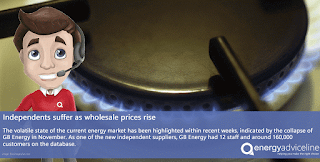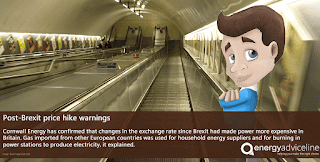Business
electricity users and householders were facing difficult decisions about their
energy contracts, with wholesale prices dipping and some suppliers offering
longer than usual fixed-rate deals, according to the Energy Advice Line.
Julian
Morgan, managing director of the price comparison, switching and advice service
for energy users, said lower wholesale energy prices and increased competition
were creating opportunities for customers to lock in good deals.
But he said
the trade-off for consumers who opted for longer-term price protection was
potentially missing out on cheaper prices if energy costs continued to fall.
“Consumers are facing some difficult choices at the moment and they need to take expert advice,” Mr Morgan said.
“Some of the deals we are seeing are very attractive due to a dip in the price suppliers are paying for gas and electricity, and some of the benefits of a more competitive energy market starting to flow through.
“Consumers
will be tempted by these deals, as well as the opportunity to lock them in for
up to four years, which is longer than usual.
“But the flip side is that if energy prices fall further, which some experts predict that they will, consumers on fixed deals will miss out on those savings.
“Consumers need to consider the value they place on knowing their energy tariff will not increase over the medium-to long-term.”
The average dual fuel bill now stands at £1,265 a year, significantly more than the cheapest tariffs currently available over one, two, three and four-year fixed deals.
But some experts say that cheap energy deals now on offer do not reflect current falls in wholesale prices, which could possibly drive down prices even further in the coming months.
“At the end of the day it’s impossible to predict the
future of energy prices, so householders and business energy users need to
consider their priorities carefully,” Mr Morgan said.
“For many people, the piece of mind of knowing that their energy tariffs will not skyrocket over the next few years is well worth the premium they pay for fixed-term deal, and the fact that they won’t benefit if prices fall.
“Other consumers will be happy for their tariffs to ‘float’ in line with what is happening in the market, because they stand a chance of making savings if and when prices fall.”
Mr Morgan said that although current market conditions presented consumers with a dilemma, the worst thing they could do was put their head in the sand when it came to energy supplies.
“It can seem tricky to make the right decision, but impartial and independent services like ours can help,” Mr Morgan said.
“We can guide householders and business owners through the benefits and disadvantages of fixed-term deals so that they can make the best decision for their budget and circumstances.
“The worst thing anyone can do is to do nothing.”
The Energy Advice Line is the UK’s leading impartial comparison, switching and advice service for businesses and householders. It actively campaigns for reform of the UK’s energy market to boost competition, get consumers a better deal from suppliers and lower energy prices.
The Energy Advice Line’s price comparison and switching service is free and completely impartial.
Consumers can obtain energy quotes with a few computer strokes based on a diverse panel of energy suppliers including the major players and smaller independent utility companies.
For further information visit Energy Advice Line



























